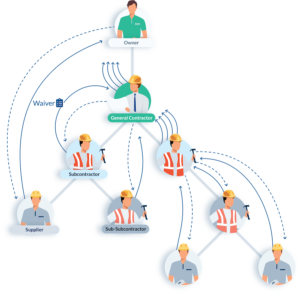
The construction payment process is a long and arduous one, filled with all sorts of requirements and paperwork. Getting something wrong during this process can result in delayed payments, or even worse, not getting paid what you’ve earned. Lien waivers are an integral part of this process. Although used on just about every construction project, many in the industry underestimate the importance of these documents. Georgia, in particular, has a unique approach to regulating lien waivers.
Lien waiver exchanges
One of the more crucial steps in the construction payment process is exchanging lien waivers. Many in the construction industry fail to realize the importance of these documents. Especially if not executed properly. The reason they are so important is that they affect nearly everyone involved on a construction project:
- Project lenders will typically require lien waivers before approving loan disbursements
- Developers or owners almost always require lien waivers to limit the possibility of a lien and to protect against the possibility of paying twice for the same work.
- General contractors have to collect lien waivers on behalf of owners and lenders in order to have payment released on the project.
- Subcontractors and suppliers must provide lien waivers in exchange for payment.
It’s essential to give these documents the attention they deserve, in order to the lien waiver exchange process right on your next Georgia construction project. There are many instances where one mistake could invalidate the entire waiver and lead to delays in payment.
This guide is meant to provide the resources, information, and forms you need to get lien waiver exchanges in the state of Georgia done right.
Introduction to Georgia’s lien waiver rules
Like most things in the legal realm, the specifics governing lien waivers vary from state to state. But generally speaking, they operate in the same fashion. They are documents signed by potential lien claimants that agree to waive their right to file a mechanics lien in exchange for payment on a construction project. That’s the basics, let’s take a look at the specific requirements for Georgia lien waivers.
For a quick reference & overview of Georgia lien waivers:
Georgia requires the use of statutory lien waiver forms
Lien waivers in Georgia allow little room for error. Many construction companies like to provide their own lien waiver forms on their projects. This is a colossal mistake in Georgia.
That’s because Georgia is one of only 12 states that regulate lien waivers by providing statutory forms. In Georgia, the law states that the lien waiver must be in “substantially the same form” as provided, which means that any variations could potentially invalidate the entire lien waiver.
The best way to ensure your lien waiver is valid and enforceable is to use the exact language and specifications provided by the statute. Georgia courts are very strict when it comes to this. So much so, that the law even requires that the lien waiver should be typed in boldface, capital letters of at least 12 point font. Don’t mess with these forms!
Mechanics lien rights can’t be waived by contract
Many contractors may try to streamline the lien waiver process by including waiver language in their contracts. We here at Levelset like to call these “no-lien clauses.”
Many states, including Georgia, don’t allow this practice. The lien waivers statute specifically prohibits this practice, stating that “a right to claim a lien may not be waived in advance of furnishing labor, services or materials.” Any attempt to do so will be void and unenforceable. The only way to waive mechanics lien rights is by the lien waiver exchange process set out in the statute.
Georgia lien waivers don’t require notarization
In fact, getting a lien waiver notarized can actually invalidate the entire lien waiver. This is a common misconception in Georgia due to the statutory language which states that lien waivers be “signed under hand and seal.” For individuals, this can be ignored. The only time this will come up is if signing on behalf of a corporation, then a corporate “seal” should be included.
We’ve written about this before in “Do Lien Waivers Need to Be Notarized?” Only 3 states actually require their lien waivers to be notarized (Texas, Mississippi, & Wyoming). In every other state- including Georgia- it is definitely not legally required.
Choosing the right form
Georgia has a particularly interesting approach to its lien waiver forms. Unlike most of the other 11 states with statutory lien waiver forms, Georgia attempts to simplify the process by providing a choice of only two forms.
Depends on the type of payment
The two types of lien waivers provided by Georgia law are interim (or progress) and final lien waivers. Interim waivers should be used throughout the project’s lifespan in exchange for progress payments. These will provide a place to add a “through date,” which sets the amount of labor, services, and materials the waiver is meant to cover. A final lien waiver form should only be used at the end of the project when no further payments are expected.
For a more in-depth look at these forms and how to fill them out, check out:
Georgia lien waivers are both conditional and unconditional
Yup, you read that right. The lien waiver form includes language that is meant to eliminate the sparring match that occurs between subs and contractors regarding conditional and unconditional waivers.
Lien waivers in Georgia are designed to be both. A signed lien waiver does actually waive mechanics lien rights, but this isn’t entirely effective until 60 days after executing the waiver. The potential lien claimant still can file an Affidavit of Nonpayment or a Claim of Lien within that period. If filed, the waiver becomes invalid. If no action is taken, then the waiver is deemed to be valid and unconditional.
At first glance, this may seem confusing, and you’re not alone. In fact, the same question was posted in our Ask an Expert Center: How do 60-day expiration of lien rights work for Georgia waivers?
Bottom line
These seemingly innocent documents that fly around on every project are incredibly powerful and important to the construction payment process. The good news for Georgia contractors is that they are strictly regulated to provide the best protection for all parties involved. A little understanding goes a long way. If you’ve made it to the end of this article, you are one step closer to ensuring you get paid what you’ve earned!
Additional resources





